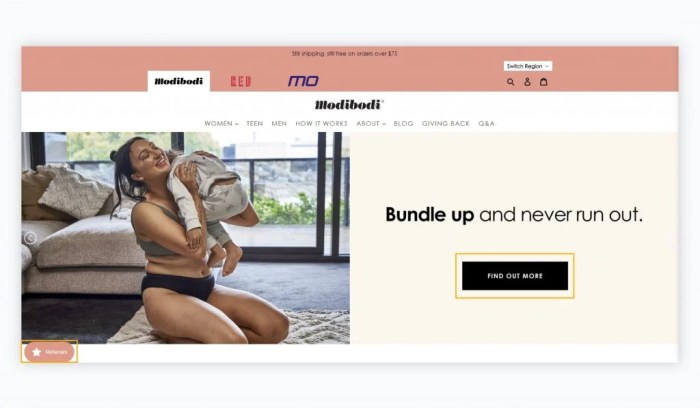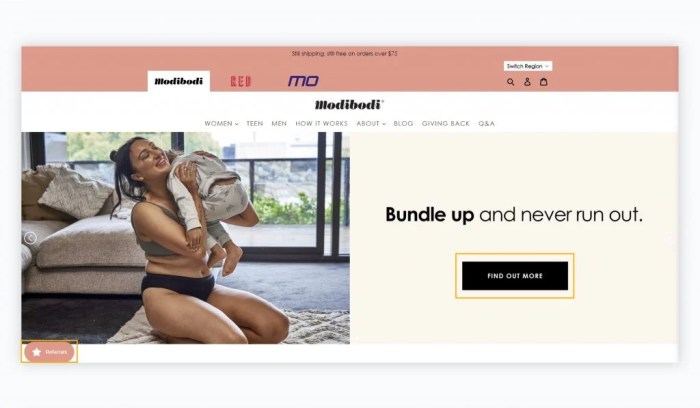Referral marketing and your professional services brand are intrinsically linked. Building a thriving referral program isn’t just about boosting leads; it’s about crafting a brand identity that fosters trust, loyalty, and advocacy. This exploration dives into the strategies and techniques needed to transform referrals into a powerful engine for growth within your professional services business.
From defining referral types and crafting compelling brand stories, to implementing successful referral programs and measuring their impact, we’ll cover everything you need to know to build a robust referral engine. We’ll also explore the ethical considerations and technological tools to support your efforts.
Defining Referral Marketing for Professional Services
Referral marketing, in the context of professional services, is a powerful strategy that leverages existing relationships to generate new business. It relies on satisfied clients and partners recommending the service provider to their networks, capitalizing on trust and word-of-mouth. This approach is particularly effective in professional services, where reputation and credibility are paramount. The strength of referrals often stems from the perceived value and quality of the service provider, making referrals a highly credible source of new business.This approach contrasts sharply with traditional marketing strategies like advertising, which rely on broad reach rather than targeted recommendations.
Referral marketing focuses on building relationships and fostering loyalty, leading to a higher conversion rate and increased customer lifetime value. A key aspect of success in professional services referral marketing is cultivating genuine connections and delivering exceptional service, which are the foundation of trust and positive recommendations.
Core Principles of Referral Marketing in Professional Services
Referral marketing in professional services is built on the foundation of trust and reputation. Happy clients are more likely to recommend your services, and a strong referral program encourages this behavior. The core principles revolve around identifying key referral sources, nurturing existing relationships, and creating systems to capture and reward referrals. It’s not just about collecting names; it’s about fostering genuine relationships that benefit both the referrer and the service provider.
Examples of Successful Referral Programs in Professional Services
Many successful referral programs in professional services industries leverage existing client networks and reward both the referrer and the referee. For instance, law firms often incentivize referrals with bonuses or discounts, while consulting firms might offer tiered referral programs based on the volume of new business generated. A notable example is a financial advisory firm that provides a generous referral bonus to clients who refer new clients, which is tied to specific metrics and success rates.
This demonstrates a clear incentive structure for both the referrer and the referred. Successful referral programs frequently include transparent and clear communication of the program rules and benefits.
How Referral Marketing Differs from Other Marketing Strategies
Referral marketing distinguishes itself from other marketing strategies by its emphasis on existing relationships. Traditional advertising campaigns typically aim for broad reach, whereas referral marketing focuses on targeted recommendations from trusted sources. This targeted approach yields higher conversion rates, often at a lower cost compared to traditional advertising methods. Referral marketing is more akin to word-of-mouth marketing, amplified and structured to create a systematic approach.
Framework for Categorizing Different Types of Referrals
A structured approach to referral marketing requires a framework for categorizing different referral sources. This classification helps in understanding the most valuable referral sources and tailoring the program accordingly. A comprehensive framework might include:
- Client Referrals: These are recommendations from existing clients who have experienced the value of your services. They represent a significant source of new business, given the existing trust and relationship.
- Employee Referrals: Employees who are passionate about the company and its services can be powerful referral sources. An effective employee referral program can tap into their professional networks and foster a sense of loyalty and pride.
- Partner Referrals: Collaborations with complementary businesses can create mutually beneficial referral opportunities. Partners can introduce clients and prospects to each other’s services, leading to a win-win scenario.
Potential Benefits of Referral Marketing for Professional Services Brands
Referral marketing offers a range of benefits for professional services brands. These advantages often translate to higher profitability and sustainable growth.
Building a strong referral marketing strategy is crucial for any professional services brand. It’s all about leveraging your existing network and positive word-of-mouth. To really nail down what sets your brand apart, check out this webinar recap, webinar recap 21 best differentiators and how to find yours , which dives deep into identifying unique differentiators.
This knowledge is directly applicable to creating a referral program that resonates with your target audience and boosts your brand’s visibility.
- Increased Customer Acquisition Costs (CAC): Referral marketing often yields a lower CAC compared to other marketing strategies, leading to a more cost-effective approach to acquiring new clients.
- Improved Brand Awareness: Positive referrals contribute to enhanced brand visibility and credibility. This increased visibility can lead to a stronger reputation within the industry and a larger client base.
- Higher Customer Lifetime Value (CLTV): Referrals often lead to clients who are more engaged and loyal, resulting in higher customer lifetime value.
Building a Referral-Driven Brand Identity
Building a strong brand identity isn’t just about logos and colors; it’s about cultivating a reputation that resonates with potential clients and inspires referrals. A referral-driven brand identity is built on trust, expertise, and a commitment to exceeding client expectations. This approach goes beyond transactional services; it fosters long-term relationships that naturally lead to referrals.A referral-driven brand identity isn’t a one-size-fits-all solution; it’s tailored to the specific values and expertise of your professional services firm.
Understanding your target audience and aligning your brand messaging with their needs is paramount. This approach emphasizes the unique value proposition you offer, highlighting the benefits clients receive and how those benefits translate into positive outcomes.
Integrating Referral Marketing into Brand Identity
A consistent brand message across all platforms—website, social media, marketing materials—is crucial. This unified message should prominently feature client testimonials and success stories. Showcasing your firm’s commitment to quality and client satisfaction builds trust and encourages referrals. This involves demonstrating how your work solves problems for clients and achieves positive results.
Creating a Strong Brand Story for Referrals
A compelling brand story is more than just a history; it’s a narrative that resonates with potential clients and positions your firm as a trusted advisor. This story should highlight the values and mission of your firm, emphasizing how you deliver exceptional service and achieve tangible results for clients. It should articulate the firm’s unique expertise and how it helps clients succeed.
Emphasize the personal touch and dedication your team brings to every project.
Defining a Compelling Professional Services Brand Persona
A strong brand persona is a representation of your ideal client and the values you embody. This persona should reflect the values, experiences, and aspirations of your target audience. This persona helps you tailor your messaging and services to effectively connect with clients and build lasting relationships. It guides the creation of content, marketing strategies, and interactions with potential clients.
Cultivating a Culture of Referrals within Your Team
A culture of referrals isn’t imposed; it’s cultivated through consistent training and incentivization. Empowering your team to actively seek referrals fosters a positive and rewarding environment. This involves providing resources, tools, and support for building relationships with clients and encouraging them to advocate for your services. This culture promotes a mindset where referrals are seen as a positive outcome of client satisfaction.
Referral marketing is crucial for boosting your professional services brand’s visibility. Leveraging tools like Salesforce Journey Builder 2, salesforce journey builder 2 , can help you create targeted campaigns to nurture leads generated through referrals. This automation streamlines your outreach and increases the likelihood of converting those referrals into paying clients, ultimately strengthening your brand’s reputation.
Referral Incentive Program Structure
| Brand Attributes | Customer Benefits | Referral Incentives |
|---|---|---|
| Expertise in a specific niche | Tailored solutions to address unique industry needs | Percentage-based commission on referred clients’ first year revenue |
| Exceptional client service | Long-term partnership and ongoing support | Gift cards or exclusive access to webinars/training sessions |
| Strong commitment to results | Measurable improvements and positive ROI | Tiered reward system based on referral volume and client retention |
| Proven track record of success | Confidence in achieving desired outcomes | Recognition and public acknowledgment in firm newsletters or social media |
Implementing Referral Programs: Referral Marketing And Your Professional Services Brand

Turning your network into a revenue engine requires a well-structured referral program. This isn’t just about asking clients to recommend you; it’s about creating a system that fosters genuine referrals, rewarding both the referrer and the referred. A robust program fosters loyalty, expands your reach, and positions your professional services brand as a trusted resource.Implementing a referral program is a strategic investment, not a fleeting marketing tactic.
It’s about building long-term relationships and cultivating a culture of recommendation. This guide breaks down the key steps in creating a successful referral program.
Developing a Robust Referral Program
A well-designed referral program requires careful planning and execution. This involves defining clear goals, understanding your target audience, and selecting appropriate incentives.
- Define clear goals and target audience: Before launching any program, establish specific, measurable, achievable, relevant, and time-bound (SMART) goals. Determine the desired number of referrals, the types of clients you want to target, and the metrics you’ll use to track success. Understanding your ideal client profile will help you tailor the referral program to resonate with your existing network.
- Craft compelling referral messages: Your referral message should be concise, persuasive, and clearly Artikel the benefits for both the referrer and the referree. Highlight the value proposition of your services and emphasize how a referral can help them solve their problems. Make it easy for people to share their experiences and encourage referrals.
- Choose the right incentives: Incentives are crucial for motivating referrals. Consider a variety of rewards, such as discounts, gift cards, cash bonuses, or exclusive access to events. Tailor incentives to your target audience and your budget. A referral program with no incentives is unlikely to be successful.
Establishing Clear Referral Guidelines and Expectations
Clear guidelines prevent confusion and ensure everyone understands the program’s rules.
- Artikel the referral process: Provide clear instructions on how referrals should be made. A simple, well-structured process encourages participation and reduces friction. Include the steps from initial contact to confirmation of the referral.
- Define eligibility criteria: Establish clear criteria for both the referrer and the referred. Who is eligible to refer? What services or clients are eligible to be referred? Defining these criteria upfront minimizes ambiguity and fosters fairness.
- Establish timelines and reporting requirements: Set clear deadlines for referrals and establish a system for reporting referrals. This keeps the program on track and ensures transparency. Provide a system for tracking the progress and success of referrals.
Offering Incentives and Rewards for Referrals
Incentivizing referrals is key to driving participation and generating results.
- Reward both referrers and referees: A successful referral program rewards both the person who makes the referral and the person who is referred. Consider a commission structure or tiered rewards system.
- Tailor rewards to the target audience: Offer rewards that resonate with the needs and preferences of your target audience. A bonus for a sales professional might be different from a discount for a marketing professional.
- Ensure transparency and fairness: Clearly communicate the referral program structure and incentives to all stakeholders. Make sure the system is fair and equitable for everyone involved.
Tracking and Measuring the Success of Referral Programs
Tracking program success is essential to making adjustments and optimizing performance.
- Identify key performance indicators (KPIs): Define the metrics you’ll use to track the program’s effectiveness, such as the number of referrals generated, the conversion rate of referrals into clients, and the revenue generated from referrals. These KPIs provide insights into the program’s success.
- Utilize analytics tools: Leverage analytics tools to track and analyze referral data. These tools provide insights into referral patterns, the effectiveness of different incentives, and areas for improvement. This data will be vital in refining the program over time.
- Regularly review and adjust the program: Regularly review the referral program and make necessary adjustments based on performance data. This continuous improvement approach helps maximize the program’s effectiveness and ensure it remains aligned with business goals.
Comparing Referral Program Structures
Different program structures cater to various needs and goals.
| Program Structure | Description | Pros | Cons |
|---|---|---|---|
| Commission-based | A percentage of the revenue generated from the referred client is paid to the referrer. | Motivates high-performing referrers; aligns incentives with revenue generation. | Potential for inflated referral rates; can be complex to manage. |
| Bonus-based | A fixed amount is paid to the referrer for each successful referral. | Simpler to manage; less prone to inflated referral rates. | May not incentivize high-volume referrals; might not be as motivating as commission. |
| Points-based | Referrers earn points for referrals, which can be redeemed for rewards or incentives. | Flexibility in rewards; aligns with various referral types. | Requires a comprehensive rewards system; potential for lower motivation compared to commission. |
Referral Marketing Strategies
Referral marketing isn’t just about getting more clients; it’s about building a powerful network of advocates who champion your brand. Effective strategies cultivate loyalty and amplify your reach, transforming passive clients into enthusiastic promoters. This approach fosters organic growth and builds a robust, sustainable client base.Engaging clients and employees in a referral program requires a strategic and personalized approach.
It’s not a one-size-fits-all solution. Different approaches work best for various professional service businesses, depending on their target audience and internal culture. Tailoring communication methods and incentives to resonate with your specific audience is key to successful referral programs.
Engaging Clients for Referrals
Effective referral programs need to tap into client satisfaction and highlight the value proposition of your services. Clients who feel valued and understand the benefits of your work are more likely to refer others. Clear communication about the referral process and the incentives offered is crucial. This includes a simple, accessible way for clients to refer others.
- Highlight Client Successes: Showcase client testimonials and case studies prominently on your website and marketing materials. These real-life examples demonstrate the tangible value your services provide. Sharing client success stories builds trust and credibility, encouraging others to consider your services.
- Personalized Communication: Instead of generic emails, send personalized messages highlighting the specific benefits your services have brought to a particular client. This personal touch makes referrals feel more meaningful and strengthens the relationship with your client.
- Offer Exclusive Incentives: Consider offering exclusive discounts or perks to clients who refer others. This incentivizes them to actively participate in the referral process. The incentives should align with your target client’s interests and values.
Engaging Employees for Referrals
Employee advocacy is a powerful driver of referrals. Employees who are passionate about your brand and services are your best ambassadors. Internal communication plays a key role in educating and motivating employees about the referral program.
- Incentivize Employee Referrals: Implement a system of rewards and recognition for employees who successfully refer new clients. This can include bonuses, extra vacation time, or public acknowledgment. A competitive and attractive reward structure encourages employee participation.
- Internal Communication Campaigns: Regularly communicate the referral program’s details and success stories through internal newsletters, company intranets, or team meetings. Keep employees updated on the program’s progress and highlight the benefits for both the company and the individual employee.
- Empower Employees to Share: Provide employees with tools and resources to easily share information about the referral program with their networks. This could include pre-written referral emails or social media posts.
Communication Methods for Referrals
Different communication methods resonate with different audiences. Tailoring your approach is crucial for maximizing the impact of your referral program.
- Email Campaigns: Email campaigns can be highly effective for communicating the referral program’s details and highlighting success stories. The emails should be concise, compelling, and visually appealing. Regular, targeted email communication keeps the referral program top-of-mind for both clients and employees.
- Social Media Posts: Social media platforms offer a powerful way to share referral opportunities and engage potential clients and employees. Use engaging visuals, compelling captions, and relevant hashtags to reach a wider audience.
- Internal Newsletters: Regular internal newsletters can keep employees informed about the referral program, highlight successful referrals, and motivate them to participate. Include clear instructions and incentives in the newsletters to encourage employee participation.
Testimonials and Case Studies
Testimonials and case studies are powerful tools for motivating referrals. They provide social proof and showcase the value proposition of your services.
- Showcase Success Stories: Testimonials and case studies are essential for demonstrating the positive impact of your services. They build trust and credibility, making your services more appealing to potential clients.
- Vary the Formats: Use various formats to showcase testimonials and case studies, such as short videos, written testimonials, or visual presentations. This keeps the content engaging and accessible.
- Strategic Placement: Place testimonials and case studies prominently on your website, marketing materials, and social media channels. This increases their visibility and impact.
Potential Pitfalls
Referral programs, while powerful, can have potential drawbacks if not implemented correctly.
Referral marketing is key to growing your professional services brand. Tracking the success of these referrals, however, often requires a deep dive into data. A robust analytics dashboard, like the one found at analytics dashboard unlocking data driven decision making , can help you understand which referral sources are most effective and tailor your strategies accordingly.
This data-driven approach is crucial for optimizing your referral marketing campaigns and ultimately strengthening your brand’s reputation.
- Lack of Transparency: Clients and employees need to understand the referral process, incentives, and how their referrals will be tracked. Transparency builds trust and avoids confusion.
- Inadequate Incentives: Incentives should be meaningful and attractive to the target audience. A lack of incentive can discourage participation.
- Poor Communication: Clear and consistent communication is vital for keeping clients and employees informed about the referral program. Ambiguous or poorly communicated programs can lead to frustration and decreased participation.
Examples of Successful Referral Marketing Campaigns
Several professional services firms have successfully implemented referral programs. These examples demonstrate the power of targeted strategies and personalized communication.
- Example 1: [A specific firm] implemented a tiered referral program with escalating rewards for both clients and employees, aligning with their specific client base and employee demographics. This targeted approach increased client and employee participation significantly.
- Example 2: [Another firm] leveraged social media platforms by partnering with industry influencers to promote their referral program, resulting in a considerable increase in qualified leads.
Measuring and Optimizing Referral Performance

Referral programs are powerful tools for professional services firms, but their effectiveness hinges on meticulous tracking and analysis. Understanding how your program performs allows for adjustments and improvements, ultimately maximizing its impact on client acquisition and brand growth. Thorough measurement and optimization are crucial to ensure that referral efforts translate into tangible results.
Referral Tracking Methods
Effective referral tracking involves multiple methods, each contributing a unique piece to the overall picture. Implementing robust tracking mechanisms across various touchpoints is critical. This includes utilizing unique referral codes or links, integrating with CRM systems, and employing dedicated tracking software. A well-defined tracking system is essential for collecting detailed data on referral sources, campaign performance, and ultimately, client acquisition costs.
Analyzing Referral Data
Data analysis is the key to unlocking insights from your referral program. By examining referral data, patterns emerge, revealing which strategies resonate with your target audience and which underperform. Critical factors include referral source (e.g., past clients, networking events, online platforms), referral channel, and the specific actions taken by referrers. Careful analysis will identify successful referral paths and identify areas for optimization.
Adjusting Referral Programs Based on Performance
Data-driven adjustments are paramount to refining referral programs. Performance analysis often reveals opportunities to tailor incentives, enhance communication strategies, and optimize targeting. For example, if referrals from specific channels are consistently higher, consider amplifying activities in those areas. Conversely, if certain referral incentives are ineffective, they should be adjusted or replaced.
Key Metrics for Referral Program Success
Regular monitoring of key metrics is essential to track the effectiveness of referral programs. This data allows for a deeper understanding of what works and what needs improvement.
| Metric | Description |
|---|---|
| Referral Volume | The total number of referrals generated by the program. |
| Conversion Rate | The percentage of referrals that convert into paying clients. |
| Average Referral Value | The average revenue generated by each referral. |
| Referral Source Performance | Identifying which channels or individuals generate the most referrals and conversions. |
| Cost Per Acquisition (CPA) | The average cost associated with acquiring a client through referrals. |
| Customer Lifetime Value (CLTV) | The predicted revenue a client will generate throughout their relationship with the company. |
Continuous Improvement Framework
A continuous improvement framework is crucial for long-term success in referral marketing. This involves regularly reviewing program performance, identifying areas for enhancement, and implementing changes based on data insights. Establishing a schedule for periodic reviews, including the analysis of key performance indicators (KPIs), ensures that the program remains aligned with strategic goals. This iterative process fosters a dynamic approach to referral marketing, ensuring its ongoing effectiveness.
Technology and Tools for Referral Marketing
Referral marketing, in the professional services sector, is no longer a supplementary tactic, but a cornerstone of growth. Leveraging technology is crucial for streamlining and scaling these efforts. Effective tools automate processes, track performance, and nurture relationships, ultimately boosting revenue and client acquisition.Modern technology empowers professional service providers to manage intricate referral programs with greater efficiency and precision.
By implementing the right tools, businesses can not only capture valuable referrals but also cultivate a strong network effect, attracting new clients and expanding their market reach.
Referral Program Management Platforms
Referral program management platforms are essential for streamlining the entire process, from initial invitation to reward fulfillment. These platforms typically offer centralized dashboards for tracking referrals, managing incentives, and communicating with both referrers and referees. They often include features for automating tasks, reducing manual work, and providing valuable insights into program performance.
- Centralized dashboards for tracking referrals and incentives.
- Automated communication tools for seamless interaction with referrers and referees.
- Robust reporting and analytics to measure program performance and identify areas for improvement.
- Integration capabilities with existing CRM systems for a unified view of customer interactions.
Referral Tracking Integration with CRM Systems
Integrating referral tracking into existing Customer Relationship Management (CRM) systems is paramount for a holistic view of client interactions. This integration allows for seamless tracking of referrals, linking the referral source to the customer’s journey, and providing valuable data for targeted marketing campaigns. It also ensures accurate attribution of revenue generated through referrals.
- Accurate attribution of revenue generated through referrals.
- Detailed tracking of the referral source throughout the customer journey.
- Improved targeting for marketing campaigns based on referral data.
- Enhanced reporting capabilities that provide a comprehensive view of referral performance.
Example Software Solutions
Several software solutions cater specifically to referral marketing, including specialized platforms and CRM add-ons. Some popular choices include ReferralCandy, Ambassador, and many CRM platforms now offer built-in referral program functionalities.
- ReferralCandy: A comprehensive platform designed specifically for referral programs, providing features for managing incentives, tracking referrals, and automating communications.
- Ambassador: A powerful platform for building and managing referral programs, focusing on fostering a strong referral community and providing analytics for program optimization.
- CRM Platforms (e.g., Salesforce, HubSpot): Many CRM platforms now offer built-in referral program functionality, allowing users to track referrals directly within their existing CRM environment.
Referral Marketing Platforms Comparison
This table Artikels various referral marketing platforms and their key features. Comparing these features helps in selecting the platform best suited to your specific needs.
| Platform | Key Features | Pricing Model |
|---|---|---|
| ReferralCandy | Incentive management, referral tracking, automated communications, comprehensive reporting | Subscription-based, tiered pricing |
| Ambassador | Community building, program management, advanced analytics, integrations | Subscription-based, tiered pricing |
| Influencer Marketing Platforms (e.g., Grin, AspireIQ) | Targeting and managing influencer relationships, campaign tracking, performance measurement | Subscription-based, performance-based |
Ethical Considerations in Referral Marketing
Referral marketing, when executed ethically, can significantly boost your professional services brand and foster strong client relationships. However, navigating the ethical landscape is crucial. This involves more than just rewarding referrals; it necessitates a deep understanding of transparency, conflict of interest avoidance, and client confidentiality.Building trust and maintaining a positive reputation are essential in the long-term success of any referral program.
Ethical considerations form the bedrock upon which a successful and sustainable referral marketing strategy is built.
Framework for Ethical Referral Programs, Referral marketing and your professional services brand
A robust framework for ethical referral programs encompasses several key areas. Transparency in program guidelines, clear communication of incentives, and adherence to professional codes of conduct are critical components. A well-defined policy, readily available to all stakeholders, establishes clear expectations.
Maintaining Transparency and Avoiding Conflicts of Interest
Transparency in referral programs is paramount. Clients and referral sources must understand the terms and conditions of the program, including the incentives offered. Detailed disclosures about the referral process, the potential for conflicts of interest, and how those conflicts will be managed are crucial.Avoiding conflicts of interest is equally important. A clear policy should Artikel situations where a conflict might arise (e.g., a referral source also being a potential client).
The policy should detail how such conflicts will be disclosed and managed, potentially involving recusal from the referral process. This safeguards the integrity of the program and fosters trust.
Protecting Client Confidentiality
Client confidentiality is paramount in professional services. Referral programs should explicitly address how client information will be handled. This includes limiting access to confidential information to authorized personnel and adhering to all relevant privacy regulations. A strict adherence to data protection policies and client consent procedures is vital.
Best Practices for Handling Customer Referrals
A crucial aspect of ethical referral handling involves ensuring the referral process doesn’t compromise client relationships. Prompt acknowledgement and follow-up with the referring client are essential. Appropriate compensation should be transparent and aligned with the value proposition of the service rendered.
- Prompt communication: Acknowledging referrals promptly builds trust and demonstrates appreciation for the referral source.
- Clear communication: Maintaining open communication channels about the referral process and its outcomes with both the referrer and the referred client fosters a positive experience.
- Fair compensation: The compensation structure should be clearly defined and fair, ensuring both the referral source and the referred client feel valued.
Ethical Dilemmas in Referral Marketing and Solutions
Ethical dilemmas can arise in referral marketing. A common scenario involves a referral source who also has a potential business relationship with the referred client. A well-defined conflict-of-interest policy, outlining procedures for managing such situations, is essential. Another dilemma could involve a referral source providing inaccurate information. A robust verification process for referrals, along with clear communication protocols, can address this issue.
| Ethical Dilemma | Solution |
|---|---|
| Referral source with potential conflict of interest | Implement a conflict-of-interest policy with clear procedures for disclosure and management. |
| Referral source providing inaccurate information | Implement a verification process for referrals, along with clear communication protocols. |
| Unclear compensation structure | Establish a transparent and fair compensation structure for referrals. |
Ending Remarks
In conclusion, successful referral marketing hinges on understanding your target audience, crafting a compelling brand identity, implementing effective programs, and consistently measuring and optimizing performance. By prioritizing ethical considerations and leveraging technology, you can build a referral-driven professional services brand that fosters long-term growth and client loyalty. It’s a journey, not a destination, so continuous learning and adaptation are key.






